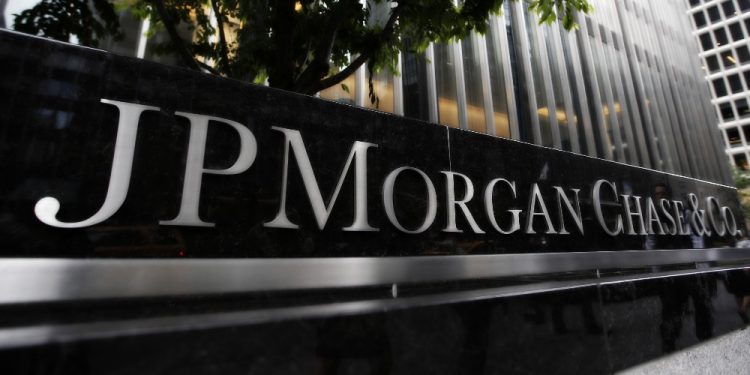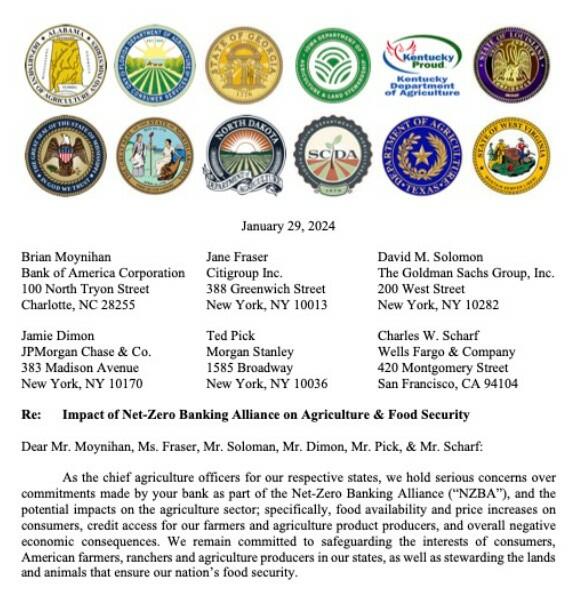(Zero Hedge)—A dozen Republican state agriculture commissioners have penned a letter to six U.S. megabanks, informing them that their push for ESG investing could wind up leading to price increases and may impact food availability.
The letter was sent to executives at Bank of America, Citigroup, Goldman Sachs, JPMorgan Chase, Morgan Stanley and Wells Fargo and took exception with the group’s membership in the UN organized Net-Zero Banking Alliance (NZBA), according to Fox News.
The NZBA is “committed to financing ambitious climate action” and is attempting to force the economy to net zero greenhouse emissions by 2050. The letter notes that this could result in “severe consequences” for farmers.
The letter reads: “Achieving net-zero greenhouse gas emissions in agriculture requires a complete overhaul of on-farm infrastructure — one of the goals of the NZBA.”
“This would have a catastrophic impact on our farmers. Proposed net-zero roadmaps describe dramatic, impractical, and costly changes to American farming and ranching operations such as switching to electric machinery and equipment; installing on-site solar panels and wind turbines; moving to organic fertilizer; altering rice-field irrigation systems; and slashing U.S. ruminant meat consumption in half, costing millions of livestock jobs,” it continues.
The letter then says: “To make matters worse, these changes will increase food costs and decrease food production at a time when global food demand is expected to rise dramatically.”
“This is compounded by the fact that, the average American has been struggling to keep up with inflation during the tenure of the Biden Administration. The reality could be much worse. These effects will hit the poor the hardest,” the commissioners wrote.
They said the goal of net zero emissions could “permanently damage American agriculture and endanger our country’s food security” and said that “American farmers should not be forced to put our food supply at risk.”
Georgia Agriculture Commissioner Tyler Harper commented to Fox: “American agriculture is sending a clear signal: we will not bend the knee to the failed, left-wing climate agenda of the United Nations that seeks to cripple one of our country’s most critical industries.”
“Now more than ever, banks that do business with America should be unquestionably supporting American industries — and that starts with the one that puts food on our tables, clothes on our backs, and shelter over our heads.”
Harper continued: “The UN’s Net-Zero Banking Alliance would be the equivalent of a run on the bank for our nation’s agriculture industry and pose a serious threat to our national security — and it must be stopped.”
Will Hild, the executive director of watchdog group Consumers’ Research, told Fox News: “Farmers and ranchers are the foundation of our economy and international climate cartels like the NZBA pose nothing less than an existential threat to their future. By forcing ESG, Brian Moynihan and his cohort have driven the cost of doing business for small family farmers and independent ranchers to astronomical heights.”
Hild continued: “The Ag officials and Commissioners hit the nail on the head in their letter: should their misguided climate extremism continue unabated, these megabanks will put our entire food supply in serious jeopardy. I applaud the states for their action, and I look forward to working with them to defend American consumers from this corporate malfeasance.”
Officials from Georgia, Alabama, Florida, Iowa, Kentucky, Louisiana, Mississippi, North Carolina, North Dakota, South Carolina, Texas and West Virginia all signed the letter. You can read the full letter here:
The letter asserts that, as members of the Net-Zero Banking Alliance (NZBA), @BankOfAmerica, @Citi, @JPMorgan, @MorganStanley, @WellsFargo, and @GoldmanSachs are all working in lockstep to force the ESG agenda onto the entire domestic food supply chain: pic.twitter.com/1phYm6iOvo
— Will Hild (@WillHild) January 29, 2024
What Would You Do If Pharmacies Couldn’t Provide You With Crucial Medications or Antibiotics?
The medication supply chain from China and India is more fragile than ever since Covid. The US is not equipped to handle our pharmaceutical needs. We’ve already seen shortages with antibiotics and other medications in recent months and pharmaceutical challenges are becoming more frequent today.
Our partners at Jase Medical offer a simple solution for Americans to be prepared in case things go south. Their “Jase Case” gives Americans emergency antibiotics they can store away while their “Jase Daily” offers a wide array of prescription drugs to treat the ailments most common to Americans.
They do this through a process that embraces medical freedom. Their secure online form allows board-certified physicians to prescribe the needed drugs. They are then delivered directly to the customer from their pharmacy network. The physicians are available to answer treatment related questions.







And all of the white shoe bankers responded with “Yeah, we know. This is why we’re doing it. More caviar and little children, please!”
Yes, but these banks are owned by BlackRock, Vanguard, State Street and Fidelity, which are the owners of each other, which means the actual beneficial owners are SECRET — you think there may be a reason for that?!?!
all these dudes have to do is get their state legislatures to pass a law that says it is a felony to discriminate against farming requests for loans. Require a simple statistical comparison of years prior to today and risk prior to today and that settles the felony charge against the board members, the CEO and any other employee aprroving such discrimination. THEN allow any farmer discriminated against to sue under tort laws.
Settles the matter in two seconds. Want to do business in a state- you are banned from discriminating against ANYONE- while they are at it- in banking lending practices using ESG as a basis or anything remotely like it. The decisions have to solely risk v. return. End of story.
Are these AG Commisioners unaware of the fact that every awful consequence they cite is the entire point of “net zero”? Seriously. More people need to wake up.